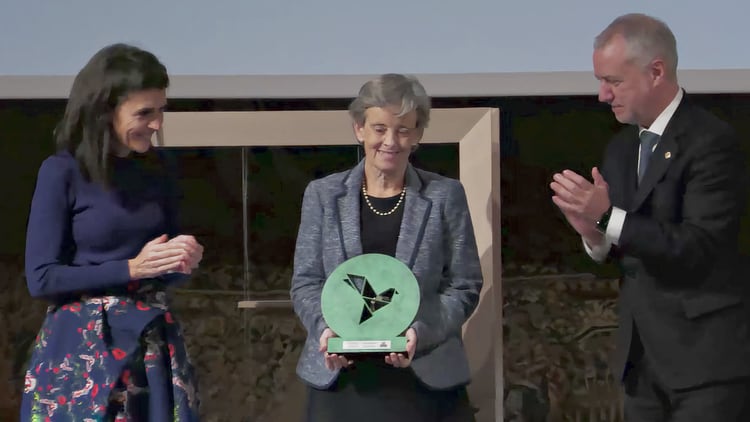The Diplomat
The Basque President Iñigo Urkullu and Nerea Melgosa, Minister of Equality, Justice and Social Policies of the Basque Government yesterday presented the René Cassin Human Rights Award 2023 to the International Commission Against the Death Penalty, ICDP.
The award ceremony took place at the Villa Suso Palace in Vitoria-Gasteiz and was received by Commissioner Marta Santos Pais, former Special Representative of the United Nations Secretary-General on Violence against Children.
The Prize, according to the jury’s minutes, was awarded to the International Commission Against the Death Penalty “for its tireless struggle for the abolition of the death penalty in all countries and regions of the world”.
The jury underlined that “through awareness-raising, research, policy advocacy, technical assistance to states and collaboration with the United Nations, ICDP works tenaciously to prevent executions, eliminate unjust and arbitrary practices, develop alternatives to the death penalty and promote fairer and more humane penal systems”.
In presenting the award, Lehendakari Urkullu said: “In the current global context of violation, threat and risk, we make the cause of the defence of human rights our own. We make our own the humanist values represented by the people and organisations that have been awarded the René Cassin Prize for 20 years. We endorse the principles that inspire the work of the International Commission against the Death Penalty.
For her part, the President of the International Commission against the Death Penalty, Navi Pillay, former United Nations High Commissioner, sent a thank you video in which she said that “this important recognition will strengthen us to continue to engage in discussions with government authorities around the world, especially those governments that still maintain the death penalty, with the ultimate goal of achieving a world free of the death penalty”.
“This award comes at an opportune time, as one of his contributions, the promotion of the Universal Declaration of Human Rights, is now 75 years old,” Pillay recalled, noting that last Sunday marked the anniversary of the Universal Declaration of Human Rights signed on 10 December 1947,
This prize, which bears the name of “a universal Basque” symbolises, said the Lehendakari, “the commitment of the Basque Country to human rights”. “Today, on the 75th anniversary of the Universal Declaration of Human Rights, we are going further: we are not only claiming the right to life for human beings, but also, in a loud voice, the right for that life to be dignified,” he emphasised.
The Councillor for Equality, Justice and Social Policies stressed that “human rights are not a theoretical, ethereal and intangible corpus”. They translate,” said Nerea Melgoso, “into rights linked to our daily lives, to our dignity as persons, to our wellbeing, to well-being and to the quality of life, ours and that of humanity. Human rights are universal rights and, because they are universal, they are also rights of proximity”.
In 2003, the Basque Government created this annual award to publicly recognise people or entities that stand out in the defence of human rights. The award was named after René Cassin, a native of Baiona, in the French Basque Country, who won the Nobel Peace Prize in 1968 and is considered to be one of the main inspirers of the Declaration of Human Rights.





